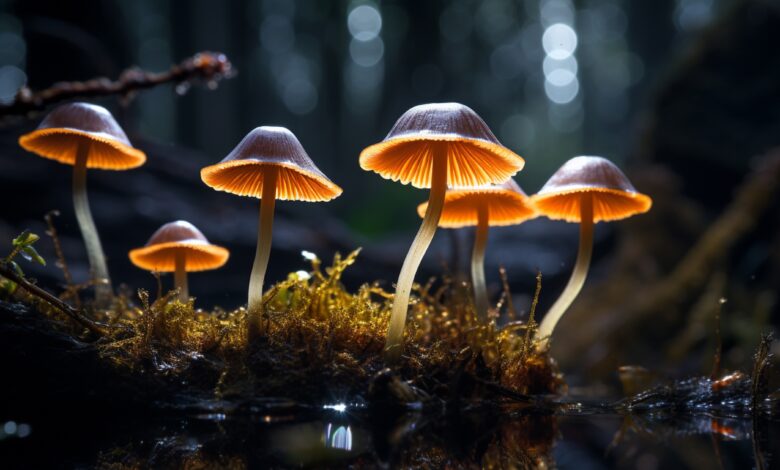
Magic mushrooms, also known as “shrooms,” have garnered significant attention for their psychedelic properties and potential therapeutic benefits. However, with this interest comes a series of questions about their duration in the body, effects, and implications for drug testing. This article explores the timeline of how long shrooms stay in your system and the factors influencing this duration.What Vitamin Deficiency Causes You to Feel Cold?
What Are Shrooms?
Shrooms are fungi that contain psychoactive compounds, primarily psilocybin and psilocin. When ingested, these compounds interact with serotonin receptors in the brain, leading to altered perceptions, enhanced emotions, and sometimes profound spiritual experiences. While shrooms are often associated with recreational use, recent studies highlight their potential in treating mental health conditions like depression and anxiety.What Are X-Rays Used for at an Urgent Care?
Metabolism of Shrooms in the Body
Once consumed, psilocybin in shrooms is converted into psilocin, the active compound that affects the brain. The onset of effects typically begins within 20 to 40 minutes and can last anywhere from four to six hours. However, the duration of shrooms in the system extends beyond the period of perceptible effects.
Absorption and Distribution
The gastrointestinal tract rapidly absorbs Psilocybin and is quickly distributed throughout the body, reaching peak concentrations within an hour. The conversion to psilocin happens predominantly in the liver, a process influenced by various factors, including the individual’s metabolic rate and liver function.
Elimination
Psilocin is eliminated primarily through the kidneys, with a small amount excreted in the feces. The half-life of psilocin, the time it takes for half of the substance to be metabolized or excreted, is approximately 1 to 3 hours. This short half-life suggests psilocybin and its metabolites are generally cleared from the bloodstream within 24 hours.
Factors Influencing Detection Time
Several factors affect how long shrooms stay in your system, including:
- Dosage: Higher doses may take longer to metabolize and eliminate.
- Frequency of Use: Frequent users may experience longer detection times due to accumulation.
- Individual Metabolism: Variations in metabolic rates can influence how quickly psilocybin is processed.
- Body Composition: Fat percentage can affect how long substances remain detectable.
- Hydration and Diet: Adequate hydration and a balanced diet can aid in the metabolism and elimination of psilocin.
Drug Testing and Shrooms
Standard drug tests, such as those for employment, typically do not screen for psilocybin or psilocin. However, specialized tests can detect these compounds:
- Urine Tests: Psilocin is detectable in urine for up to 24 hours after ingestion. This window can sometimes extend up to three days, depending on the factors mentioned above.
- Blood Tests: Blood tests can detect psilocin for up to 24 hours. They are less commonly used due to the invasive nature of blood sampling.
- Hair Tests: While not standard for psilocybin, hair tests can detect psilocin up to 90 days after use. This method is generally used for comprehensive drug testing panels.
Legal and Safety Considerations
The legal status of shrooms varies globally. In many countries, including the United States, psilocybin is classified as a Schedule I substance, meaning it is illegal to possess, cultivate, or distribute. Some regions have decriminalized or legalized the use of shrooms for therapeutic or recreational purposes, but these laws are subject to change.
Safety is a paramount concern with shroom use. The unpredictable nature of psychedelic experiences can lead to adverse reactions, including anxiety, paranoia, and psychosis. Therefore, it is essential to approach shroom use with caution, ideally under the guidance of a healthcare professional.
Potential Therapeutic Benefits
Despite legal restrictions, research into the therapeutic potential of psilocybin is growing. Clinical trials have shown promising results in treating various mental health conditions, including:
- Depression: Psilocybin-assisted therapy has demonstrated significant reductions in depressive symptoms, particularly in treatment-resistant cases.
- Anxiety: Studies indicate that psilocybin can alleviate anxiety, especially in individuals with terminal illnesses.
- PTSD: Emerging research suggests that psilocybin may help reduce symptoms of post-traumatic stress disorder.
Final Thoughts
Understanding how long shrooms stay in your system is crucial for individuals considering their use, whether for recreational or therapeutic purposes. While the effects of shrooms may wear off within hours, the compounds can remain detectable in the body for up to several days, depending on various factors.
If you are considering using shrooms, it is essential to be aware of the legal and safety implications. Moreover, if you are undergoing drug testing, it is vital to understand that specialized tests can detect psilocybin and its metabolites. As research into the potential benefits of psilocybin continues, the conversation around shrooms and their place in society will likely evolve.
Frequently Asked Questions
1. Can shrooms cause addiction?
While shrooms are not considered physically addictive, psychological dependence can develop, particularly in individuals using them frequently to cope with emotional or psychological issues.
2. How can I reduce the risk of a bad trip?
To minimize the risk of adverse reactions, it is recommended to use shrooms in a safe, controlled environment, ideally with a sober sitter present. Starting with a low dose and gradually increasing it can also help prevent overwhelming experiences.
3. What should I do if I have a bad trip?
If you experience a bad trip, try to remain calm and remind yourself that the effects are temporary. Focusing on your breathing and engaging in grounding techniques can help alleviate anxiety. If necessary, seek professional help.
4. Can I fail a drug test after using shrooms?
While standard drug tests do not typically screen for psilocybin or psilocin, specialized tests can detect these compounds within a short window after use.
5. Are there any long-term effects of using shrooms?
Research on the long-term effects of shrooms is limited, but some studies suggest potential benefits, such as lasting improvements in mood and anxiety. However, frequent use may lead to psychological issues in some individuals. https://hopeharborwellness.com/how-long-do-shrooms-stay-in-your-system/
Category: Health and Wellness
4o


